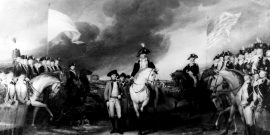The State Must Provide aims to "set things straight" when it comes to HBCU funding. But it fails to think deeply about separateness and equality.
W. B. Allen
Kendi advances through the typical stages of maturation with race always at the center of his view of himself and the world.
Washington’s objectives in cabinet management had less to do with managing diverse personalities and more to do with preserving political coherence.
A new bio highlights Washington’s early appeals to “nationality” and to the people’s sovereignty; but it makes him out to be at the mercy of circumstances.
The “1619 Project” can deliver on its promissory only by enslaving free labor.
Preserving good government depends upon a people’s ability to demonstrate the character appropriate to the task—and ours is in question.
Jack Rakove makes a plausible case for Madisonian game theory even as he maintains respect for the Madison who said “justice is the end of government.”
Politics requires fit characters, but can virtue be restored as a basis for liberty? Four contributors address this problem.
George Washington offers many lessons on how to understand the common good and living well together: it begins with character.
“We are either a United people, or we are not; if the former, let us, in all matters of general concern act as a nation.”
Martin Luther King answered his rhetorical question—chaos or community?—by dreaming of founding a new community.
W.B. Allen, emeritus dean and professor at Michigan State University, is a senior visiting scholar at the University of Colorado’s Benson Center for the Study of Western Civilization.













